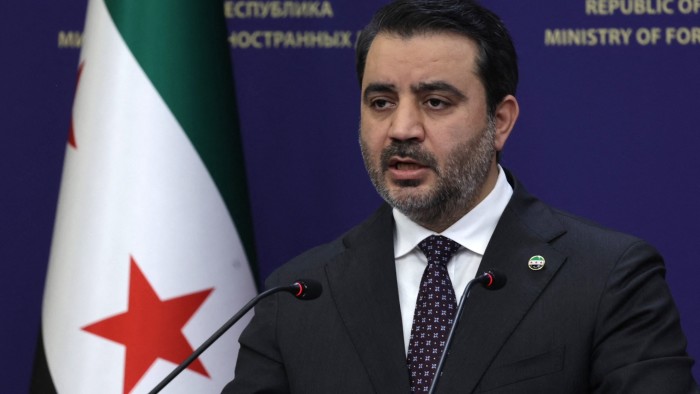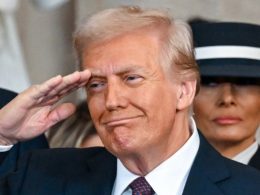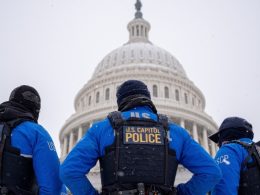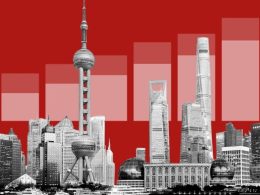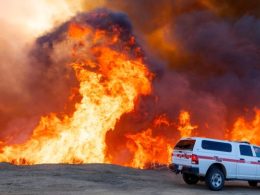Syria’s new rulers plan to privatise state-owned ports and factories, invite foreign investment and boost international trade in an economic overhaul designed to end decades as a pariah state, the country’s foreign minister told the Financial Times.
“[Assad’s] vision was that of a security state. Ours is of economic development,” said Asaad al-Shaibani in a wide-ranging interview in Damascus, his first with international press. “There needs to be law and there need to be clear messages to open the way for foreign investors, and to encourage Syrian investors to return to Syria.”
Shaibani spoke to the FT ahead of an appearance at the World Economic Forum in Davos on Wednesday, the first time Syria will participate in the annual meeting of global decision makers. He will use the trip to renew calls to lift punishing Assad-era sanctions, which he says will prevent Syria’s economic recovery and thwart other countries’ “clear readiness” to invest.
While western nations have been quick to engage with the new authorities, many say they are waiting to see if they will act on their lofty promises before easing sanctions.
The 37-year-old minister is one of the key figures in the new caretaker government and is close to the country’s de facto ruler Ahmed al-Sharaa, formerly known by his nom de guerre Abu Mohammad al-Jolani. Sharaa’s Islamist militant group Hayat Tahrir al-Sham led the offensive that toppled former dictator Bashar al-Assad in December.
In the weeks since, technocrats and former Assad-era civil servants have worked to uncover the damage done to the country and its coffers by the regime, Shaibani said.
This includes the discovery of $30bn in debt to former Assad allies Iran and Russia, non-existent foreign reserves at the central bank, a bloated public sector payroll and the decline of industries like agriculture and manufacturing, neglected and undermined by corrupt Assad-era policies.
Shaibani acknowledged that the challenges ahead were enormous and would take years to address. He said authorities were setting up a committee to study Syria’s economic condition and infrastructure and would focus on privatisation efforts, including of oils, cotton and furniture factories.
He also said they would explore public-private partnerships to encourage investment into airports, railways and roads. The challenge, however, will be finding buyers for entities that have been in decay for years in a shattered country cut off from foreign investment.
Shaibani said recovery was the immediate priority, including securing adequate bread, water, electricity and fuel for a people pushed to the brink of poverty by Assad’s rule, war and sanctions.
“We don’t want to live off humanitarian aid, nor do we want countries to give us money as if they’re throwing the investment in the sea,” he said.
The key, he said, was easing US and European sanctions on the Assad regime and on HTS, a former al-Qaeda affiliate that many western governments still classify a terrorist group.
While the US has issued several limited sanctions waivers, including for states who are seeking to help Syria in the interim, officials argue this is not enough. “Open the door for these places to start working,” Shaibani said.
While some western capitals like Berlin appear open to easing some sanctions, they are waiting to see the new Islamist-led government’s approach to issues such as women and minority rights. The EU is due to discuss the bloc’s sanctions at a meeting of foreign ministers on January 27.
Sanctions relief “must follow tangible progress in a political transition that reflects Syria in all its diversity”, the EU’s chief diplomat Kaja Kallas said this month.
Shaibani said Syria’s new leadership was working to reassure Gulf Arab and western officials that the country does not pose a threat.
Some in the region, notably the United Arab Emirates and Egypt, are wary of a resurgence of Islamist groups like the Muslim Brotherhood in Syria, while other Arab states worry the rebels’ success could revive revolutionary sentiment in their own countries.
Shaibani said his new government was not planning to “export the revolution and start getting involved in other states’ affairs”. The new government’s priority was not to pose a threat to others, he said, but to build regional alliances that pave the way for Syrian prosperity.
He said Syria’s “special relationship” with Turkey, the most active backer of rebels in their 13-year war against Assad, would allow the country to benefit from Ankara’s technology, regional weight and European relations.
But he pushed back against concerns that this would give its northern neighbour undue influence or amount to “Turkish expansion”. “There will not be nor is there subjugation,” he said.
One important challenge facing the new government is the fate of the Kurdish-led Syrian Democratic Forces, Washington’s partner in combating Isis, which Ankara considers an extension of Kurdish separatists who have long fought the Turkish state. Ankara has threatened a military operation in Syria’s north-east if Kurdish militias are not disbanded.
Since taking office, Syria’s new leaders have strived to disband the SDF and integrate its fighters into the state, invoking the need for Syrian unity, but the SDF has so far refused. Shaibani said discussions with the SDF were under way, adding that Damascus was also ready to take over SDF-controlled prisons that hold thousands of captured Isis fighters.
“The existence of the SDF no longer has justification,” Shaibani said, adding that authorities pledged to guarantee Kurdish rights in the new constitution and ensure their representation in the new government.
Source link





